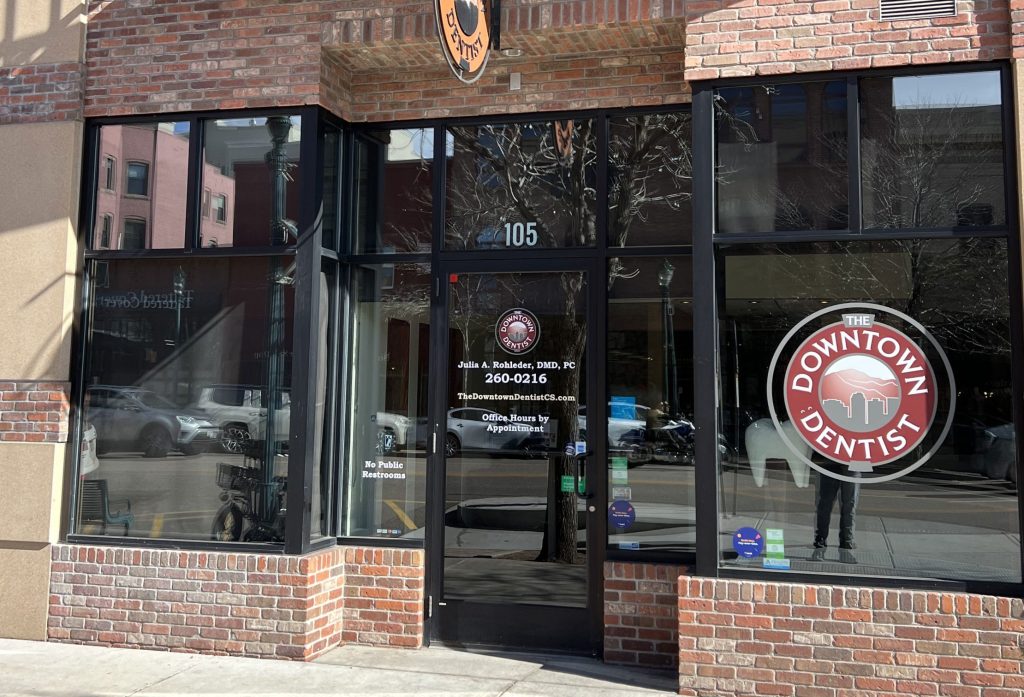Scaling & Root Planing

Scaling and root planing, also known as deep cleaning, is an essential dental procedure used to treat and prevent gum disease. Gum disease, also called periodontal disease, affects the gum tissue and can lead to tooth loss if left untreated. Whether you’re considering scaling and root planing or simply looking to enhance your dental knowledge, count on our team at The Downtown Dentist in downtown Colorado Springs.
What is scaling and root planing and how does it differ from a regular dental cleaning?
Scaling and root planing is a deep cleaning procedure that goes beyond the surface of the teeth and gums to remove tartar and plaque from the roots and smooth out rough spots. Unlike regular cleanings, scaling and root planing target the periodontal disease and help prevent its progression.
Understanding Gum Disease
Gum disease, or periodontal disease, is an infection of the gum tissue that surrounds and supports the teeth. If left untreated, gum disease can lead to tooth loss, bone loss, and other oral health complications. Severe periodontitis is a form of gum disease that affects 8.5% of adults over age 30 in the U.S. It is important to recognize the causes and symptoms of gum disease, including severe periodontitis, to take timely action and maintain optimal oral health.
Causes of Gum Disease
Gum disease is primarily caused by the buildup of bacterial plaque, a sticky film composed of bacteria and food particles, on the teeth and along the gumline. Over time, if plaque is not removed through regular brushing and flossing, it hardens into tartar, which can only be removed by professional dental cleaning.
The bacteria in bacterial plaque and tartar can irritate the gums, leading to inflammation and infection. Poor oral hygiene practices, smoking, certain medications, hormonal changes, diabetes, genetics, and uncontrolled stress levels can all contribute to an increased risk of gum disease.
Symptoms of Gum Disease
Early detection of gum disease symptoms is crucial. Look out for signs like bleeding, inflammation, tenderness, sensitivity, and receding gums. Advanced stages may lead to deep pockets forming as gums pull away from teeth. Changes in bite or denture fit could also signal gingivitis. Untreated gingivitis can progress to gum disease, causing tissue damage, tooth, and bone loss.
The Procedure of Scaling and Root Planing
Scaling and root planing, performed by a dental professional at The Downtown Dentist, involves local anesthesia for patient comfort. Specialized instruments are used to remove bacteria from tooth surfaces above and below the gumline. The procedure includes smoothing root surfaces to prevent bacterial growth and cleaning deep periodontal pockets if necessary for healing. Treatment duration varies based on gum disease severity and the outlined treatment plan.
Effectiveness of Scaling and Root Planing
When it comes to the effectiveness of scaling and root planing, this procedure is known to be highly successful in treating gum disease. By targeting the root cause of the issue and removing harmful bacteria, scaling and root planing help in reducing pocket depth and preventing further bone loss.
Studies published in reputable journals like the Journal of the American Dental Association have shown that this treatment, combined with good oral hygiene practices, can lead to significant improvements in overall dental health, ensuring a healthier mouth for the long term in the United States.
Short-Term Results
After undergoing the procedure, individuals might encounter mild discomfort or sensitivity. Within a few days, any swelling and gum bleeding usually diminish. An improvement in gum health becomes noticeable shortly after the scaling and root planing treatment, as well as a reduction in teeth sensitivity. A reduction in inflammation is a visible short-term effect of the procedure. Following specific aftercare guidelines is crucial for optimal healing.
Long-Term Results
Achieving lasting success following periodontal scaling and root planning hinges on maintaining oral hygiene diligently. Halting the advancement of gum disease stands out as a notable long-term advantage. Patients can anticipate enhanced overall oral health over time. Consistent post-treatment dental check-ups are crucial for observing enduring outcomes. Upholding good oral practices plays a pivotal role in preserving the positive effects in the extended term.
Managing Discomfort and Pain
During the procedure, a local anesthetic is commonly used to numb the area, ensuring minimal discomfort. After treatment, over-the-counter pain medication can effectively alleviate any soreness or discomfort. To reduce swelling, applying ice packs externally can be beneficial post-treatment. Adhering to post-operative care guidelines, including avoiding hard foods, plays a crucial role in minimizing pain during the recovery phase. Communication with the professionals at The Downtown Dentist about any discomfort or concerns allows for personalized adjustments to enhance your comfort level.
Dealing with Tooth Sensitivity
To address tooth sensitivity after periodontal treatment, consider using desensitizing toothpaste and an antimicrobial mouth rinse. Following scaling and root planing, it’s common to experience heightened sensitivity due to exposed roots. If the discomfort persists or worsens, contact The Downtown Dentist promptly for evaluation and guidance. Understanding the causes of this sensitivity can help you manage it effectively.
Preventing Periodontal Disease Post-Procedure
Proper maintenance of oral hygiene through consistent brushing and flossing is vital post-scaling and root planing to deter periodontal disease. Regular dental visits to The Downtown Dentist aid in monitoring gum health and preventing disease recurrence. Steering clear of tobacco and embracing a balanced diet can enhance overall dental wellness, thwarting periodontal issues.
Adherence to postoperative instructions is paramount for effective recovery and complication prevention. The experts at The Downtown Dentist may also recommend additional treatment, such as using antimicrobial agents or taking oral antibiotics, to help prevent periodontal disease post-procedure.
Importance of Oral Hygiene
Maintaining good oral health plays a crucial role in overall well-being. Daily brushing and flossing with a soft toothbrush are key in preventing plaque accumulation and reducing the risk of gum disease. Professional cleanings are vital to maintaining optimal oral hygiene and preventing potential tooth loss. By prioritizing oral care, individuals can safeguard against various dental issues and contribute to their general health. A balanced diet and regular dental appointments further support dental health and overall wellness.
Schedule a consultation, today
Scaling and root planing are crucial treatments for combating gum disease. Understanding the causes, symptoms, and procedures involved is essential for maintaining oral health. While short-term results show immediate improvements, long-term benefits include preventing further complications. Managing discomfort post-procedure and maintaining good oral hygiene is key to successful recovery.
By prioritizing dental care and following preventive measures, you can ensure the longevity of your oral health. Remember, regular dental check-ups and adherence to oral hygiene practices play a vital role in preventing periodontal diseases. Count on our team at The Downtown Dentist in downtown Colorado Springs to give your smile the best care. Schedule an appointment by calling (719) 260-0216 for our Tejon Street location or (719) 633-3711 for our Willamette Avenue location.

 Dr. Rohleder
Dr. Rohleder Meet the Team
Meet the Team Sterilization Protocol
Sterilization Protocol Frequently Asked Questions
Frequently Asked Questions Careers
Careers












